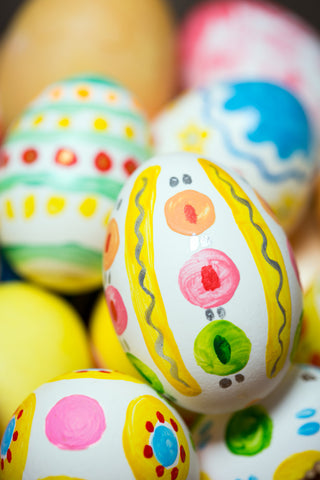Easter is one of the most important Christian holidays celebrated all over the world. It is a time of joy, hope and reborn nature. However, without a doubt, one of the most recognizable elements of Easter are eggs. Why have they become such an important symbol of this holiday?
Egg - Symbol of Life and Fertility
 The egg has been seen as a symbol of life and fertility for centuries. The ancient Egyptians and Persians believed that the world was hatched from an egg. In Indian mythology, the egg was a symbol of the beginning from which the creator of living beings hatched. In many cultures, eggs are associated with fertility, new life and vitality.
The egg has been seen as a symbol of life and fertility for centuries. The ancient Egyptians and Persians believed that the world was hatched from an egg. In Indian mythology, the egg was a symbol of the beginning from which the creator of living beings hatched. In many cultures, eggs are associated with fertility, new life and vitality.
The tradition of painting eggs
The tradition of painting eggs dates back thousands of years. Already in ancient Egypt, Rome and the Slavs, eggs were decorated and treated as magical objects. Painting eggs for Easter was practiced by many cultures around the world, including Poland.
Polish Easter eggs have a long history, dating back to the 10th century. The oldest Easter eggs were found in the town of Ostrówek, and the oldest Polish document mentioning Easter eggs comes from the 13th century. The tradition of painting eggs was also widespread in the Roman Empire, as mentioned by the poets Ovid, Pliny the Younger and Juvenal.
Symbolism of Easter Eggs
Easter eggs have their own symbolism. First of all, they are a symbol of new life and reborn nature. As we know, Easter is celebrated in spring, when nature comes to life after its winter nap. Eggs, as symbols of fertility, fit perfectly into this context.
Furthermore, eggs are also associated with the resurrection of Christ. In Christianity, the egg is identified with the victory of life over death. Just as a bird comes out of an egg, Jesus rose from the dead and gave hope for eternal life.
Easter Basket filled with symbols
One of the most important elements of the Easter tradition is the holy basket, i.e. a basket of food that is blessed in the church. Eggs are an integral part of this basket. They are intended to symbolize fertility, health, abundance and joy.
There are also other products in the Easter basket that have their own meaning. The lamb symbolizes Jesus as the Lamb of God who offered a sacrifice for the salvation of humanity. The bread represents the body of Christ, and the meat - His suffering.
Modern Traditions Related to Eggs
 Nowadays, the tradition of painting and decorating eggs is still alive, although it has developed over the centuries. During Easter , many people have fun creating beautiful and colorful Easter eggs, using various techniques such as batik wax, acrylic paints, and even decorating eggs with decoupage.
Nowadays, the tradition of painting and decorating eggs is still alive, although it has developed over the centuries. During Easter , many people have fun creating beautiful and colorful Easter eggs, using various techniques such as batik wax, acrylic paints, and even decorating eggs with decoupage.
Easter eggs are also a popular gift and decorative item. They can be found in various forms, from chocolate eggs to decorative wooden Easter eggs. They are often used to decorate homes, tables and gardens during Easter .
The timelessness of the Easter egg
There is something incredibly fascinating about the temporality of the Easter egg. It is the only item that remains unchanged for centuries. The egg, whether it comes from ancient Egypt or is a modern work of art, still symbolizes the same thing - life, fertility and the rebirth of nature. This immutability makes the egg one of the most important symbols of Easter .

